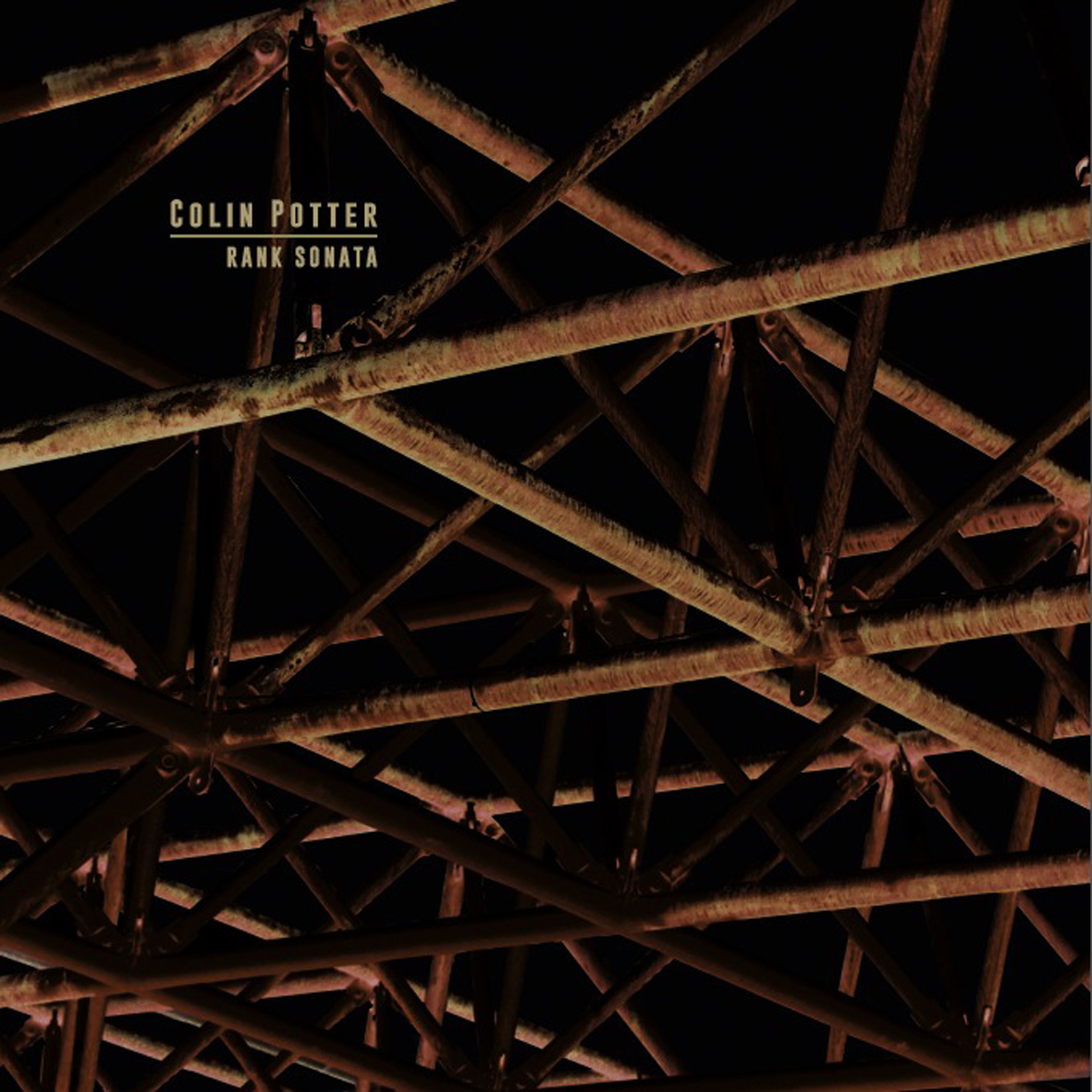Colin Potter, "Rank Sonata"
 Colin Potter is a bit of an unusual case, as he is a justifiably well-known figure in experimental music circles due to his involvement with Current 93 and Nurse With Wound (among many others), yet his solo career remains something of a woefully underheard and underappreciated endeavor.  A large part of that is because most of Potter’s oeuvre to date has quietly gone out into the world via limited edition CDRs and cassettes on his own ICR label, thus eluding most casual fans.  Consequently, it is something of an event for Rank Sonata to get released on vinyl.  It certainly warrants it though, as the album’s epic centerpiece and raison d’être, "A Wider Pail of Shale," is a trance-inducing tour de force of industrial-damaged outsider techno that should not be missed.
Colin Potter is a bit of an unusual case, as he is a justifiably well-known figure in experimental music circles due to his involvement with Current 93 and Nurse With Wound (among many others), yet his solo career remains something of a woefully underheard and underappreciated endeavor.  A large part of that is because most of Potter’s oeuvre to date has quietly gone out into the world via limited edition CDRs and cassettes on his own ICR label, thus eluding most casual fans.  Consequently, it is something of an event for Rank Sonata to get released on vinyl.  It certainly warrants it though, as the album’s epic centerpiece and raison d’être, "A Wider Pail of Shale," is a trance-inducing tour de force of industrial-damaged outsider techno that should not be missed.
Hallow Ground
It is difficult and dangerous to try to identify a distinct "Colin Potter sound," given that he has had his fingers in so many different and divergent pies over the years, but I most closely associate him with ambient drone music.  After all, Colin and ICR are tied to many of the genre's most revered releases (Andrew Chalk, Monos, Ora, Jonathan Colecough, etc.).  That being the case, I was not surprised at all when "A Wider Pail of Shale" opened Rank Sonata with its dreamy swells of limpid drones.  My surprise instead arrived about two minutes later, as the blissed-out warmth unexpectedly began to cohere into a thumping four-on-the-floor house beat and wonderfully buzzing and squelching pulse without dissipating any of its hallucinatory spell.  In fact, the spell only deepened, as the thumping, throbbing groove gradually grows more and more complex, embellishing its perversely organic proto-techno beat with metallic percussion flourishes and a host of appealingly clattering and flanging textures.  All the while, the drone elements continue to evolve as well, creating a druggy, buzzing, and floating haze that sometimes takes over the song completely.  For nearly 20 minutes, "Wider Pail" beautifully waxes and wanes, filling the entire first side of the album.  And as far as I am concerned, it could have easily gone on for twice as long (or even more) with absolutely no danger of diminishing returns, as Potter has essentially created an endlessly compelling, complexly layered, and richly vibrant Möbius strip of a piece.
Given that "Wider Pail" is essentially perfect, the rest of the album has an incredibly difficult act to follow.  In fact, it is hard to imagine any piece that could possibly sustain or build upon the momentum of Rank Sonata’s first half…unless that piece is perhaps a reprise, so that is naturally what Potter included. He saved that for the end though, opting to flesh out Sonata's remaining time with a couple of well-chosen older pieces.  The B side opens with "And," an enjoyable remastered piece from Potter's And Then album (2000) that marries a slinky half-comic/half-noir motif with an ingenious clattering rhythm that sounds like the fruit of a day spent gleefully experimenting with a contact mic and a kitchen full of pots and plates.  The following "Knit Where?" originates from 2006's Brainwaves compilation.  While not as substantial as the other pieces, it makes for an enjoyable interlude nonetheless, as its simple repeating theme is gradually consumed by a host of field recordings that sounds like a meadow full of mechanical crickets trying to drown out a ping-pong match as a distant giant lumberingly approaches.  Then, of course, there is "Beyond the Pail," which is essentially a relentless and maniacal dub version of "Wider Pail" that ratchets up both the pace and intensity of the original.  It is similarly great, though considerably shorter.
If Rank Sonata has a fault, it is only that Potter recycled some old material and that it is not on the same level as the two versions of "Wider Pail."  In Potter's defense, however, both "And" and "Knit Where?" definitely feel like they belong and both contribute significantly to Sonata's effective sequencing.  Also, it is not like either piece is widely available or remotely overexposed: I have enjoyed Potter’s work for years and have still only heard a fraction of it, so anything from Potter's somewhat distant past is likely to be new to many other listeners as well.  More significantly, however, Rank Sonata's strengths easily eclipse its arguable weaknesses (and its wince-inducing puns) and render them irrelevant.  As far as I am concerned, the only real problem is that Sonata is currently limited to only 300 copies, as "Wider Pail of Shale" is easily one of the most mesmerizing, infectious, and inexhaustible pieces of music that any experimental musician will release this year.
Samples:
 



